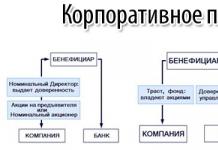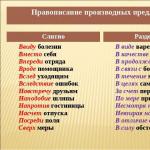Beneficiary(from French benefice - benefit, profit or lat. beneficium - benefit) is a beneficiary, that is, the recipient of a cash payment, income, profit and other advantages and benefits according to a debt document or agreement. The beneficiary can be either a legal entity or an individual. The spelling “beneficiary” is common.
The beneficiaries are:
1. Persons who receive income from their property held in trust or used by third parties. For example, when leasing or leasing movable and immovable property, or transferring shares for use to brokers.
2. Recipients of insurance payments appointed by the policyholder. In this case, the beneficiary is indicated in the insurance policy (it is possible to insure property in favor of a third party). If the beneficiary specified in the insurance contract does not live to see the payments, the person who inherited the rights becomes the beneficiary.
3. Persons indicated by the issuing bank as the owner of the documentary letter of credit.
4. Persons receiving financial benefits from the trust.
5. Recipients of funds in collection.
6. Recipients of a bank certificate.
Hello! In this article we will talk about the beneficiaries.
Today you will learn:
- Who is the beneficiary;
- How is he different from a beneficiary?
- Who is the beneficial owner;
- How to protect the rights of a beneficiary.
Who is the beneficiary
Beneficiary is a borrowed word, and to unravel its essence, you need to turn to its French roots. Translated from French, this word means “profit” or “benefit”. Therefore, the simplest definition of a beneficiary is the person who receives the profit.
Speaking in financial language, the beneficiary is the person who owns the profit-generating assets. But we should immediately make a reservation that these are not only those individuals who actually own all the property of a particular company. In fact, the beneficiaries are everyone who can control (change) the activities of the organization.
That is, a beneficiary is a person who has the right to dispose of the organization’s property, regardless of whether it belongs directly to him or not. That is, these are individuals or legal entities who de facto own the funds, and therefore the company itself.
The concept of beneficial owner
The definition that the legislation attributes to the beneficial owner is written in Federal Law No. 115-FZ “On combating money laundering and the financing of terrorism.” It states that a beneficial owner is a person who directly or indirectly has a stake in a legal entity (25% or more) and can control the activities of that entity.
That is beneficial owner - the individual who directly or indirectly manages the activities of the company. Almost all management decisions lie on his shoulders, as well as those that can completely affect the economic activity of the company. Essentially, this is the person who has real power in the company and controls it.
The same regulation contains a definition of a beneficiary as a person for whose benefit the company's operations are carried out. Including according to agency, surety and other agreements.
Therefore, the full beneficiaries may be:
- Heirs and other persons who acquire benefits after the death of the recipient of any payments from a legal entity;
- Landlords;
- Persons holding bank accounts;
- Clients transferring property or funds into trust management;
- Beneficiaries under insurance contracts;
- Real company owners.
Some individuals, in order to fully ensure their own safety and the lack of attention from government agencies, try to hide information about the real benefits and owners of organizations. Most often, the actual owners of legal entities hide all information about themselves.
To avoid confusion, you need to immediately distinguish between two concepts: beneficial owner and beneficiary. The first has a direct or indirect opportunity to influence the activities of the organization, manage it and generate income. The second, is the usual beneficiary, receives profit from the activities of the organization or any other assets. Government authorities are only interested in information about the beneficial owners of a company, and not about its beneficiaries.
Rights and obligations of the beneficiary
According to the law, the beneficiary has a number of rights that protect his activities. But state protection only works if a person is state registered as a beneficiary of a particular company, which happens quite rarely.
However, the list of beneficiary rights includes:
- Disposal of shares in the company. The beneficiary has the right to fully or partially sell part of the company to other shareholders or third parties independently, without the consent of the remaining members of the board of directors or other senior management body;
- Appoint, control and dismiss the general director of the company legally;
- Participate in the board of directors of the company and vote in decision-making according to the share in the company;
- Receive income in accordance with the percentage of shares (other shares) of the company.
The most important right of the beneficiary is the appointment and control over the activities of the general director of the company. The beneficiary has the right to appoint a nominee owner who will legally represent his interests within the company, and in case of a conflict of interests, also independently legally remove him from office.
But in addition to rights, the beneficiary also has a number of responsibilities:
- Register with government agencies;
- Provide all information about himself and the company of which he is a beneficiary;
- Pay taxes as a beneficiary of the company.
But, as you can guess, these rights and responsibilities are often neglected by the actual beneficiaries of various companies. It is more important for them to remain in the shadows so that government agencies cannot recognize who receives the company’s funds and how they get them.
Through nominal owners - general directors of companies, the beneficiaries carry out their activities within the company, making all management decisions, but in the event of a conflict of interest, all disagreements are resolved in accordance with the agreement, thanks to which, with proper legal registration, it is possible to force a person not only to resign from his position , but also fully pay compensation to the injured beneficiary.
Protection of beneficiary rights
According to Russian legislation, a beneficiary can go to court if his interests have been violated by other beneficiaries of the company, or by its management.
The court will consider the petition in the following cases:
- If the terms of the agreement between the company and the beneficiary were not met;
- If the company conducts illegal or unlicensed activities;
- If the rights of a beneficiary within the company were illegally reduced;
- If the company deliberately concealed facts of infringement of the interests of the beneficiary;
- In other similar cases.
At the same time, the beneficiary can legally protect himself from the activities of nominee managers with the help of a trust management agreement that was concluded with these persons.
Most nominee managers have much less power than the beneficial owner, and he can terminate the contract with them at any time, which will entail their dismissal, or deprivation of their position, and, accordingly, of all nominal power within the company.
Thus, the beneficiary can pre-trially take advantage of the documentary support of his position and oblige the nominal managers not only to resign from their position, but also to compensate for all damage received by the beneficiary. But it is worth remembering that only a well-drafted agreement can serve as a guarantor of respect for the rights of the real beneficiary and owner of the company in disputes with the nominal manager.
Beneficial owner of a legal entity
Beneficial owner of a legal entity – a person or group of persons who have a direct or indirect impact on the activities of the company.
The beneficial owner of a legal entity is the person whose voice influences the activities of the organization. He can participate in the meeting of shareholders, directly influence the policies of the legal entity, make a decision on changing the form of ownership of the legal entity and, in general, any management decision.
Disclosure of information about the beneficial owners of a legal entity is most often not permitted. Quite often, in documents submitted for registration, as well as in the charter of legal entities, the actual activities of such persons in the organization are deliberately downplayed. Who these people are and what position they occupy in the company is truly known only to the bank employees who manage their accounts, as well as to the commercial agents who carry out transactions on their behalf.
Information about the beneficial owners of legal entities is hidden in the following cases:
- When doing business in offshore zones;
- In order to improve the taxation of individuals and the legal entity as a whole;
- When laundering funds obtained by criminal means.
In order to hide the identity of the beneficial owner and protect him from unnecessary attention of government authorities, trusts and other funds that manage securities, fictitious executive directors, bearer shares that allow the beneficial owner to participate in the activities of the company, etc. can be used.
Ultimate beneficiary
Now we have come to the end of the chain of beneficiaries.
Ultimate beneficiary – the individual who receives real profit from the company’s activities.
And if a company can have countless ordinary beneficiaries - beneficiaries, from trading partners to ordinary shareholders, then there is only one final beneficiary, and rarely there can be several of them.
In essence, the final beneficiary is the person through whom the company carries out its activities. And this person receives the lion's share of the enterprise's profits, while remaining in the shadows. This is beneficial for those who carry out shady activities, laundering income through offshore companies, as well as people whose attention to their person from government agencies is completely unprofitable.
In connection with the effect of Federal Law 115-FZ on the territory of Russia, banks are actively looking at the final beneficiaries, preventing them from laundering money obtained by criminal means. But despite all the measures, most of the funds received by the final beneficiaries, who do not appear in any way in the company’s documents, go through more than one stage of “laundering” and end up in the account of the real beneficiary.
Disclosure of information about ultimate beneficiaries
Who may need information about the ultimate beneficiaries?
First of all, these will be government bodies that, within the framework of 115-FZ, will combat money laundering, terrorist financing and the illegal withdrawal of funds abroad.
This information may also be required for credit institutions. By identifying the final beneficiary, the bank can assess the risks of working with the company, its solvency and reputation, and based on all the data received, a decision is made to issue a loan.
All companies wishing to receive a loan or even just open an account are required to provide all information about the final beneficiaries to credit institutions. In this case, you need to fill out standard sample documents in the organization.
Credit institutions also provide information about final beneficiaries to Rosfinmonitoring. If a credit institution does not comply with these requirements, it will be subject to sanctions, including revocation of its license.
Also, in rare cases, government agencies themselves may request information about the beneficiary. In addition to actions within the framework of 115-FZ, this information serves as an additional guarantee of the partner’s honesty when concluding government contracts. When information for such contracts is submitted to the authorized body, a document is drawn up - “Information on the chain of owners”. It contains all the details of the company, as well as a complete list of all the founders and beneficiaries of the company, down to the final ones.
Partner companies may also need information about the final beneficiaries. To insure yourself against involvement in shadow financial schemes, and, accordingly, closer attention from government agencies and prosecution, you need to find out about the final beneficiaries of your partners before concluding contracts with them.
Bank guarantee: beneficiary and principal
In lending, the term beneficiary is used in the area of issuing a bank guarantee. There are two persons involved - the beneficiary and the principal. They are opposites: the beneficiary is the creditor, that is, the beneficiary, and the principal is the borrower. For failure to fulfill obligations on the part of the principal, the obligations are assumed by a third party - the principal's guarantor bank.
That is, a contract is concluded between the principals and the beneficiary to provide a loan to the principal. He turns to his bank with a request to issue him a guarantee regarding the loan issued. And if the credit institution decides to satisfy this request, then this bank assumes the obligation to repay the debt and interest of its client if he is unable to pay this amount.
At the same time, there is also a four-party form of transaction, in which the principal’s bank provides its guarantee to the beneficiary’s credit organization, which, in turn, provides its client with a guarantee on its own behalf.
The presence of an intermediary increases the cost of the guarantee, but at the same time increases the reliability of the entire transaction, because now there are two banks that have direct or indirect obligations to the beneficiary. Thanks to this, the risk of non-payment is reduced to a minimum.
The bank guarantee is for:
- Guaranteed fulfillment of obligations;
- Making payments in specific situations;
- Execution of work under government and commercial contracts;
- Movement of goods through customs.
But despite the fact that nominally the guarantee is a bank guarantee, on the territory of the Russian Federation, at the request of the principal, both a legal entity and an insurance company can act as a Guarantor. The legal entity undertakes to pay off the debts of the principal in the event of failure to pay the principal and interest to the beneficiary.
According to Russian legislation, the issuance of guarantees is included in the list of banking operations. But world practice suggests that narrowing the range of legal entities that provide guarantee services may reduce the popularity of this instrument as a means of ensuring loan repayment.
Due to this, transactions for which this tool will be used as a way to diversify risks will drop significantly, which can lead to an increase in fraud on the part of both banks and legal entities-principals.
But at the same time, if an insurance company performs a service from the list of banking services, then by law it is subject to penalties or complete revocation of its license. And this is despite the fact that the whole essence of insurance companies involves carrying out such operations. After all, it is the insurers who must reduce the risks of non-payment by issuing guarantees (insurance) and subsequent payments if the principal does not pay the money (an insured event occurs).
In such conditions, banks act as a kind of monopoly on the provision of bank guarantee services. The benefit of the guarantor bank can range from 2 to 10% of the amount that will have to be paid if the client does not fulfill his obligations. In this case, all expenses fall on the principal’s side, because he needs additional security in order to receive a loan or ensure his obligations to the beneficiary.
That is, the beneficiary in the usual sense of the word, in a bank guarantee, is the guarantor himself, because it is he who receives the profit from the conclusion of the guarantee agreement. The beneficiary can also be called the creditor, who receives an additional guarantee of the return of funds - that is, additional profit.
Organizations without beneficiaries
There are organizations that by their nature cannot have beneficiaries. These are any non-profit and charitable organizations whose purpose is not to make a profit. They may not have beneficiaries, because there is no receipt of profit in their charter, and, accordingly, there may not be persons who receive it either.
But any commercial organization sets itself the primary task of making a profit. And when there is profit, then there are those persons who receive it - that is, beneficiaries. But despite such a broad legislative base, as well as the powers of government organizations and banking institutions, quite often it is not possible to reliably determine the real ultimate beneficiary of some companies.
Shadow schemes make it possible to keep the identity of the final beneficiaries secret, hiding them from unnecessary attention of the tax authorities, and allowing them to withdraw money earned from crime abroad and launder it there.
A statistical fact confirming this information is that Cyprus issued about $60 billion to Russian companies in the form of almost interest-free loans in 2014, which is almost 3 times the level of its GDP. This only means that the volumes of funds exported from the country and resources laundered abroad are still enormous.
Under the law, a beneficiary is an individual or legal entity who directly or indirectly receives profit from the activities of the company. The beneficiary of a legal entity (ultimate beneficiary) is an individual who manages 25 percent or more of the company and has the ability to influence the activities of the organization.
State and banking authorities are interested in identifying the final beneficiaries in order to combat the legalization of proceeds from crime or the financing of terrorism within the framework of 115-FZ. Banks are interested in the final beneficiaries in order to assess the reliability of the company and predict the likelihood of it fulfilling its obligations.
In the language of a bank guarantee, the beneficiary is the creditor who issues funds from the principal and receives a guarantee of the fulfillment of his obligations from the guarantor bank. At the same time, the real beneficiary, in the official meaning outside the language of bank guarantees, is the guarantor bank, because it is he who receives the main benefit from the transaction, acting as a guarantor in these relations.
Hello, dear readers of the financial magazine “site”! In this article we want to tell you who the final beneficiary(beneficiary), who the beneficial owners are, how beneficiaries differ from beneficiaries, and so on.
After all, the development of economic relations implies the emergence of new subjects in this sphere of economic activity of society, for which special terms are used.
With the formation of a market economy, such subjects became categories of persons receiving profit from various types of business activities or generating income through the use of investment instruments. This term is used to identify such persons.
From the material you will learn:
- Beneficiary - who is he?
- Differences between beneficiaries and beneficiaries;
- Who is the beneficial owner (owner) and how to submit information about the beneficial owner - who needs it and why;
- How to stop violation of the rights of beneficiaries - rights and obligations
- and so on.
So, let's look at each point in detail.
From the article you will learn everything about the concept of “beneficiary” (beneficiary): who is and what it is, to whom and what information about the beneficial owners needs to be submitted, and much more.
This term comes from the French word meaning benefit, profit.
Therefore, the simplest definition of the term “ beneficiary" (Also beneficiary) is the person receiving the profit.
In a less simplified sense, beneficiary (beneficiary) - this is the person who actually owns the assets, business objects and other valuables of the organization.
In economic activity, not everything is determined by the amount of income received in a given period. The prospects and directions of profit-making activities are also important, and here the source of financial flow management is also important, because from their distribution and use, the viability of any commercial enterprise and the amount of income received also depend.
Therefore, in a broader sense, beneficiaries (beneficiaries) are considered not only individuals and legal entities who have income from certain financial transactions, but also persons who have the ability to control the activities of the organization and disposal of her property.
That is, beneficiaries are the persons who actually own a particular company.
2. Who are the beneficial owners - definition 📝
The legal definition of beneficial owner is contained in Federal Law of the Russian Federation No. 115 of 08/07/2001.
According to this definition:
Beneficial owner — This an individual who directly or indirectly has predominant participation in a legal entity ( more than 25%) and opportunity control actions legal entity.
The same regulatory act contains a definition of a beneficiary as a person for whose benefit actions are taken in relation to funds and property, including on the basis of relevant agreements ( agency, surety, trust management, commission).
Who is called the beneficial owner and who can become it
Depending on the scope of economic relations and situations arising in the process of disposing of property, the meaning of the term “beneficiary” may vary somewhat.
Based on the type of activity and relationship to property, beneficiaries may be:
- heirs indicated in the will as persons accepting certain property into ownership or management, as well as persons who are beneficiaries in the event of the death of the recipient of any payments;
- landlords who rent out property they own for a regular fee;
- bank account holders;
- clients of trust organizations who have provided their property or finances for trust management to generate income;
- owners of documentary letters of credit;
- persons who are recipients of payments under insurance contracts;
- actual owners of the companies.
To ensure their own safety or to avoid claims from various government bodies, in the modern financial world they very often resort to concealing information about the true owner of certain assets.
This especially often concerns the property and management of the economic activities of legal entities.
3. Beneficial owner of a legal entity - rights and features 📋
Beneficial owner of a legal entity - this is one or more actual owners of the organization who have right or opportunity direct or indirect impact on the company's activities.
At the same time, the personal data of such persons may not be specified in registration And statutory documents of the organization or their official involvement in the firm may be significantly downplayed.
The identity of such owners is usually known only bank employees And commercial agents .
The beneficiary of a legal entity can take part in the meeting of shareholders and other owners of the company, in which his voice is dominant in deciding issues related to the distribution of profits and the organization’s participation in investment projects.
Non-disclosure of information about actual owners used frequently:
- when conducting activities using offshore zones;
- when optimizing the taxation of organizations;
- when legalizing financial resources received in violation of legal requirements.
To ensure the participation of the actual owner in the activities of the organization without disclosing information about his identity, a variety of property registration schemes and legal documentation.


Basic schemes for registering the property of beneficiaries (beneficiaries). When constructing complex schemes for registering property and settlements, it is important to correctly and clearly understand and use the tax laws of the jurisdictions used. Only with proper construction and structure of the organization, they will truly turn out to be anonymous, tax-free or low-tax, protected from unfair actions of third parties
For example, a beneficiary gains access to company accounts on the basis of a power of attorney issued in his name by a nominee director. Ownership of property is carried out through ownership of bearer shares or by attracting individuals, performing the functions of nominal shareholders.
Or the beneficiary enters into an agreement with the trust fund for the management of the company’s shares, access to the organization’s accounts and the ability to manage them, the beneficiary receives through a trustee.
4. Who is the final beneficiary - definition 📖


Definition of term - ultimate beneficiary
The chain of beneficiaries always ends with a specific person receiving a certain profit. This is the kind of face that is ultimate beneficiary.
Thus, ultimate beneficiary — this is an individual receiving profit from the activities of the company or property management.
5. The difference between a beneficial owner and a beneficiary is the main difference 📊
In a number of sources the concept beneficiary And beneficiary are identical, at the same time, in Russian legislation these two terms have some differences.
In this regard, regulatory authorities, as part of the fight against illegal actions it is the beneficial owners of the companies who are interested, as persons determining the policy of the organization and making decisions about possible illegal fraud.
6. Who needs information about beneficial owners and why 📌
Beneficial ownership information is important for government agencies in order to counter:
- legalization of proceeds from crime;
- financing of terrorist and other criminal organizations;
- illegal withdrawal of funds abroad.
For organizations who provide business lending, information about the final beneficiaries is important when making decisions about granting loans. Based on the identity of the beneficiary, the company’s reputation and the risks of its lending are assessed.
Reporting information about the final beneficiaries at the request of banking structures, is mandatory for organizations wishing to obtain a loan or open a bank account.
To submit information about the beneficial owner, we suggest downloading sample documents:
(doc. 60.5 kb)
(doc. 139 kb)
Sample of filling out the document (section 1)


Information about the beneficial owner - a sample of filling out the Sberbank form, section 1
At the same time, credit organizations in Russia must provide information about beneficiaries to Rosfinmonitoring.
Failure to comply with this requirement may result in the imposition of significant penalties on organizations related to financial transactions:
- securities market participants;
- Insurance companies;
- pawnshops;
- leasing companies (we already wrote about why it is needed in the previous article);
- credit organizations.
Who needs information about the owners of the company, including beneficiaries, and why?
Information about the actual owners may be requested from the company itself or state and municipal structures , as well as related commercial organizations .
In addition to countering illegal activities and financial fraud, such information may be requested when concluding various public procurement contracts.
When providing information about the owners, a document is drawn up containing information about the owners of the company, including individuals who are founders of organizations that are among the company's participants.
This certificate is called " Information about the chain of ownership, including beneficiaries", it contains information about the name of the company, its management, data of the founders ( company details, passport details, residential addresses of individuals).
Example of filling out a document:


An example of filling out the document “Information on the chain of ownership.” You can download the document from the link below.
Download example of filling and sample:
Instructions for filling out (doc. - 41.6 kb)
Table (example), where and what data should be specified:
7. General rights and obligations of the beneficiary (beneficiary) 📑
The beneficiary has a number of rights protected by law. Naturally, legislative protection is guaranteed only with documentation relationship between the beneficiary and his agents – nominee owners of the company and account V.
The beneficiary has the right:
- dispose of your share in the enterprise. The beneficiary may, for example, partially or fully sell his share;
- monitor the performance of duties by the company’s management, appoint and dismiss the general director on legal grounds;
- participate in shareholder and constituent meetings, in accordance with the share owned, participate in decision-making;
- receive income from the company's activities in accordance with the amount of dividends.
The functions and rights of the beneficiary vary depending on the sphere of economic relations in which the person acts as a beneficiary.
For example, if a company participates as a beneficiary in the provision of bank guarantees, it is obliged to promptly fulfill the relevant terms of the agreement.
In this case, the beneficiary company has the right to fulfill the obligations to repay the debt assumed by the guarantor organization.
8. Participation of the beneficiary (beneficiary) in insurance and inheritance
Beneficiary (beneficiary) in insurance - these are persons who receive insurance payments upon the occurrence of an insured event (under previously concluded insurance contracts).
At the same time, the beneficiary not necessary is the person or property owner insured in accordance with these contracts.
For example, when receiving a mortgage loan, the property that becomes the property of the borrower is insured, and the beneficiary, in the event of damage or destruction of the property that is the subject of the pledge, there will be a creditor . At least until the borrower fulfills the terms of the loan agreement.
The beneficiary of insurance payments can be determined by the insured person himself. For example, in life insurance, the beneficiary of the insurance may be the spouse of the insured person.
In inheritance matters beneficiary may change depending on the will of the testator or due to the death of persons specified in the will. Thus, property can be bequeathed to a relative, to whom the testator entrusts guardianship of minor children.
Or the will indicates the brother of the deceased, but if he dies before receiving the inheritance, the brother’s heirs (heirs by right of representation) will actually receive the property.
Thus, when distributing the inheritance, the beneficiaries will be the persons specified in the will and persons entitled to inheritance by law.
9. Participation of the beneficiary in the bank guarantee 📃
In banking, the service of providing a bank guarantee is currently widespread.
When concluding a transaction between two parties , the institution providing such a guarantee guarantees the fulfillment of obligations under the transaction by one of the parties or for the performance of the contract as a whole.
The transaction thus becomes tripartite, with the participation of:
- guarantor (organization providing the guarantee);
- beneficiary (the party to whom, for example, a monetary reward should be paid for fulfilling the terms of the transaction or certain services are provided);
- principal (the party applying for a bank guarantee).


Participation of the principal and beneficiary in a bank guarantee - scheme and principle of operation
Who are the principal and beneficiary in a bank guarantee - differences and features
Principal and beneficiary – these are absolutely opposite sides of legal relations. In this case, the beneficiary will be the creditor, but the principal will be the debtor, where a third party (guarantor) assumes responsibility for failure to fulfill obligations.
Guarantees of fulfillment of the terms of the contract may also be provided in order to ensure:
- making payments in specific situations;
- return of advance payments;
- execution of work under various contracts and tenders, including government ones. A bank guarantee is provided by the contractor to confirm his own financial solvency;
- movement of goods through customs;
- return of funds provided under lending agreements.
Despite the name, in practice such guarantees can also be provided insurance companies And commercial organizations at the request of the principal. This circumstance is classified as a legal conflict in the Russian Federation.
On the one hand, the issuance of guarantees legally relates to banking operations, and on the other hand, limiting the circle of persons acting as guarantors of the fulfillment of contractual obligations is contrary to international practice and unreasonably narrows the scope of use of this financial instrument.
For the performance of services classified by the Russian legislator as banking operations, the insurance company may be fined or its license may be revoked, given the seemingly natural capabilities of insurance companies to insure a commercial transaction by providing guarantees.
The beneficiaries of the existence of such a conflict may be banking institutions that actively lobby their own interests and currently have actual monopoly on the right to act as a guarantor in contracts. The cost of a bank guarantee varies from 2 to 10% on the amount of the guarantee payment.
The beneficiary of bank guarantees directly is the party to whom compensation is paid by the guarantor in case of failure of the principal to fulfill his obligations under the concluded transaction e.
10. Controlling persons and offshores 🗺
An offshore is considered to be a country or territory of a state with simplified conditions for doing business. We wrote in detail about when it is best to use them in the last issue.
In such economic zones there are great opportunities to hide data about the real owners of a business due to a special regime for registration and reporting of non-resident organizations.
The legislation of many countries regularly introduces various restrictions for residents to carry out transactions with organizations registered in offshore zones. However a complete ban is practically never applied anywhere.
The concept of “controlling person” was used before the term “beneficiary” appeared in domestic legislation. For the owner of a share in an enterprise to fall under this definition, it was necessary to own directly or indirectly more than 50% of the enterprise's shares or votes in the governing body. It was the size of participation in the organization that determined the availability of the opportunity to manage the enterprise.
This approach complicated the work of law enforcement agencies, because to evade responsibility it was enough to divide the property in the company between three owners(i.e. owner 49 % shares of the organization avoided responsibility).
The adoption by domestic legislators of the term “ beneficiary ", made it possible to somewhat reduce the discrepancy between terminology and the realities of economic activity, focusing, first of all, on the ability to control the organization.
Currently under controlling persons are understood as owners at least 10% shares of the enterprise, giving them the right to vote, as well as persons holding positions in the organization that allow them to influence decision-making processes in the company.


Protecting the rights of the beneficiary from the actions of third parties - basic recommendations
The rights of the beneficiary can be violated both by other business owners and by the management of his own enterprise.
The main ways of violating the rights of the actual owner are:
- Failure to comply with the agreement concluded between the owners or with the hired management of the company;
- The organization carries out illegal activities, including without an appropriate license;
- Reducing the beneficiary's ability to control the organization's activities;
- Concealment by the company's management of information about the actual state of affairs in the organization;
- An obstacle to obtaining income from the company's activities or property management.
To avoid the negative consequences of violating the rights of the beneficiary, it is recommended conclusion of written agreements , including trust management agreements.
Such agreements may provide non-disclosure of information about the beneficiary and actual owner of the property or company, as well as provide the opportunity to recover damages from illegal or unprofessional actions.
12. Are there organizations without beneficiaries 🔔
Organizations that do not have beneficiaries may be various non-profit associations, since their goal is not making a profit.
As for commercial organizations, then, of course, if there is profit, then there are also persons receiving income. However, often it is not possible to establish the final beneficiary.
Therefore, despite the fairly broad powers and capabilities of banking institutions and government agencies to identify the actual beneficiaries, existing schemes for concealing the true owners of a business allow you to keep the identity of the final beneficiary secret , especially in cases of trust management of business or property.
13. Conclusion + video on the topic 🎥
Given the relative novelty of the concept of beneficiary in the domestic economy, the practice of using this term, the definition of the rights, duties and responsibilities of beneficiaries in the activities of controlled commercial organizations and the management of various property, has not yet fully developed.
This is also hampered by the involvement of various politicians and civil servants in the shadow management of various financial structures and assets.
At the same time, it is ensuring transparency of information about the actual owners of property, shares and shares in enterprises, especially those with the ability to manage organizations, that will allow increase tax efficiency And protect bona fide market participants from involvement in various shadow and illegal financial frauds.
In conclusion, we suggest watching a video about clarifications on the beneficiary law:
The term “beneficiary” began to be actively used in business practice in connection with the development. And since people started talking about the “deoffshorization” of Russian assets in 2012, a whole series of legislative acts have been adopted aimed at identifying the real owners of domestic companies and clarifying their status. Meanwhile, the term has other meanings, which are also widely used in economics. Let's talk about who can call themselves a beneficiary, what this term means, where it is applied and how it is regulated by law.
Beneficiary – This is the person who owns the property and receives income from its use. In the public space, this term is more often used in relation to business, when we are talking about the real owner of the company, even if formally its owner is another person. In legislation, the concept of a beneficiary is reflected in Law No. 115-FZ of 08/07/2001. This document states that the beneficial owner is a person who has a share in the property of over 25% and controls the action of a legal entity through concluding an agreement with it.
The word “beneficiary” came to us from the Middle Ages - a benefice was then called a feudal lord who served the benefactor for the allotment of land received from the principal (and, accordingly, for the income from this allotment). For the first time in its modern meaning, the term “beneficiary” as “beneficiary” was used in the additional protocol to the Income Tax Treaty (a treaty between the USA and Great Britain) in 1966. In subsequent years, the regulatory framework expanded: descriptions of the functions of intermediaries working on behalf of the beneficiary appeared, the property management process was formalized, and a clearer definition of the final owner was introduced. Now in most countries, including Russia, legislation on beneficiaries is based on the Third Directive of the European Parliament 2005/60/EC. In the specified document, the beneficiary is defined exactly as done in the paragraph above.
Beneficiary and final beneficiary: what is the difference?
It is necessary to distinguish between the concepts of beneficiary and ultimate beneficiary. If in the first case we can talk about both an individual and a legal entity that directly benefits from the use of property, then the final beneficiary is always an individual who actually owns the property, regardless of how long the chain from him to the company in which it is formed income.
Such a chain, by the way, can consist of dozens of links-legal entities, each of which is the formal founder of the next. The ultimate beneficiary is the person who actually receives income from the activities of the firm or the use of the property.
What is the difference between a beneficiary and a beneficiary?
Sometimes the beneficiary is understood as the beneficiary. The list of such persons includes:
- persons receiving income from property transferred for the use of other persons. For example, you rented out an apartment under a contract. Formally, other people live and use the apartment, but you receive the income, and in fact the housing is yours. The same applies to movable property - for example, a car leased under the relevant agreement;
- persons receiving income from securities transferred into trust management. Your brokers manage you, but you are the beneficiary, since the income goes to you;
- persons receiving insurance payments under an insurance contract. For example, parents insure their child under an endowment insurance agreement. Premiums are paid for a certain number of years, and upon reaching the age specified in the policy, the child, as a beneficiary, receives the accumulated amount;
- The immediate recipients of a bank certificate or financial benefit from property placed in trust.
The positions of beneficiary and beneficiary have both common features and differences.
Similarities
- Both the beneficiary and the beneficiary receive income from their property provided under the agreement to other persons.
Differences
- The beneficiary has over 25% of the share in the property from which he receives income. Accordingly, he has the right to control the process of operational management of his property (for example, by appointing a director to the company). The beneficiary does not have such a right, since he is either completely alienated from the property from which he receives income, or has a share that does not give the right to manage assets (less than 25%).
- The beneficiary can be either an individual or a legal entity. The final beneficiary is only an individual.
Historically in Russia, company owners have not sought to advertise their involvement in them. At first, because of not always legal methods of acquiring property, as well as because of the threat to one’s own safety, then because of the reluctance to come under the close attention of tax and other government authorities. The reluctance to bear public responsibility in the event of a company or violation of the law also plays a role.
Therefore, almost all large and most medium-sized companies have organizations, rather than individuals, as their formal owners. Often they are lined up in a chain in such a way that it would be difficult to trace the final owner. Everyone remembers how after the terrorist attack in 2011 at Domodedovo airport, even the Prosecutor General’s Office for a long time was unable to find out who is now the owner of this very large facility. As a result, it turned out that since 1993 the formal owner has changed 10 times, while the same businessman Dmitry Kamenshchik remained the beneficiary.
Another textbook example is Roman Abramovich. The ownership structure of his companies has not been officially confirmed by anyone and exists only in the conjectures of stringer journalists. It is believed that he owns the company Millhouse Capital UK Ltd, which, in turn, owns Evraz 8 securities, but not directly, but through the Cypriot Lanebrook. Other assets of Abramovich are managed in equally complex ways - OJSC Holding Moscow-Invest, LLC Diall Alliance, etc. And the Prodo company belongs to Abramovich through the Cypriot offshore Nevern Overseas.
However, legislation makes it possible to find out who is the beneficiary of a particular company.

Publicity of the beneficiary
For companies whose shares are listed on the world's largest stock exchanges, as well as for other public joint stock companies, publication of their real owners is an obligation. Registers of shareholders of such companies are publicly available on official websites.
However, even in such circumstances, creating a confusing ownership structure can remove the beneficiary from public scrutiny. This is done primarily through the creation of offshore companies: in many offshore zones, local laws allow company owners to dispose of the dividends they receive without advertising their activities.
Information about beneficiaries that is difficult to access by the general public can still be obtained by some organizations by force of law.
Who has the right to know about the beneficiaries of a legal entity
First of all, information is disclosed to banks when opening a legal entity account (Clause 14, Article 7 of Law No. 115-FZ). If a credit institution suspects that the owners indicated in the company documents are nominees, the bank can use any sources of information to obtain information about the beneficiaries.
The item “data on the company’s beneficiaries” is also included in the documentation filled out by the government procurement participant, as well as in the questionnaires filled out by counterparties of large companies with state participation.
In 2017, the Russian government approved the Rules for the provision by legal entities of information about their beneficial owners. They indicate that information about beneficiaries must be provided within 5 days at the request of the Federal Tax Service via telecommunication channels. The form for providing information is approved by the tax authorities. Also, data on the beneficial owners of a legal entity are required to be sent upon request to the Federal Service for Financial Monitoring (Rosfinmonitoring).
Company owners circumvent these requirements in this way: if there is a trust agreement, the general director of the company is indicated as the beneficiary. A bank or government agency can only check whether the general director is the beneficiary using indirect methods (including media reports).
If it is impossible to accurately determine the beneficiary, the law provides for recognition as such a director or executive body of the company (board of directors, for example, or meeting of shareholders). All individuals with over 25% of the company’s shares are also automatically included in the list of beneficiaries.
Banks bound by anti-money laundering legislation use special techniques to identify beneficiaries. It follows from Law 115-FZ that a beneficiary is an individual who directly or through third parties owns more than 25% of the company’s capital. Moreover, while direct participation in capital is obvious, indirect participation is not so easy to identify.
Banks usually apply clause 3 of Art. 105.2 of the Tax Code of the Russian Federation, in which the share of indirect participation in the capital of an organization’s company is defined as follows:
1 A chain of beneficiary organizations is identified with direct participation in the capital of each subsequent link.
2 The shares of direct participation of such beneficiaries in the capital of each subsequent company are established.
3 The product of direct participation shares in each subsequent organization is determined. This will be the share of indirect participation.
The individual has a 40% stake in Horns and Hooves LLC, which, in turn, formally owns 60% of the shares in Hooves and Horns CJSC. The product of shares in capital will be: 0.4 * 0.6 = 0.24 or 24%.
Details on how to recognize the final beneficiary can be found in the clarifications of the Ministry of Finance of the Russian Federation dated August 16, 2013 No. 03-01-18/33535; dated June 21, 2013 No. 03-01-18/23476; dated March 12, 2012 No. 03-01-18/1-27, as well as in the letter of the Federal Tax Service of Russia for Moscow dated June 7, 2012 No. 16-15/050574@.
Let us note that in addition to the formal signs of an individual’s indirect participation in the capital of a company, there must be other facts indicating that the citizen is not just a shareholder, but a beneficial owner who controls the company (clause 3.3 of Bank of Russia Regulations dated March 2, 2012 No. 375 -P):
- An individual must own or control through other persons more than 25% of the total number of shares/shares with voting rights.
- An individual can influence decisions made by the executive body of a legal entity (for example, the board of directors or the general director). We are talking about any decisions, including issuing loans, financial transactions, company reorganization, and so on.
Banks also have the right to determine themselves other factors by which they identify the beneficiaries of their clients. Sometimes this becomes the cause of misunderstandings: a credit institution blocks an account on the basis of suspicions of money laundering, and it is not possible to find out what exactly the company is suspected of doing because of the confidentiality of the bank’s internal protocols.

Beneficiary questionnaire
The form by which information about beneficial owners is provided to the Federal Tax Service of the Russian Federation is quite simple. It indicates the personal and contact information of the final beneficiaries. The transfer of this information is not considered a violation of personal data protection laws.
Beneficial Owner Information
Limited Liability Company "Kutuzov", OGRN 1234567890123, INN 123456789, address St. Petersburg, st. Promyshlennaya, 13, office 104
compiled as of 01/01/2018
| 1. | FULL NAME. | Petrov Stepan Sidorovich |
| Citizenship | RF | |
| Date of Birth | 01.01.1973 | |
| Passport series ** ** number ** **, issued 01/01/2002 by the Saratov Internal Affairs Directorate, department code 642-000 | ||
| – | ||
| St. Petersburg, Zelenaya st., 123, apt. 12. | ||
| 987654321 | ||
| Tel. +7***1234567, e-mail: [email protected] | ||
| 2. | FULL NAME. | Brown John |
| Citizenship | Great Britain | |
| Date of Birth | 15.02.1981 | |
| Identity document (series, number, date of issue, who issued it, department code) | Passport 012334567 11/12/2011 United Kingdom Passport Agency | |
| Migration card details (if available) | – | |
| Registration address at place of residence or place of stay | St. Petersburg, st. Solnechnaya, 1, apt. 212. | |
| TIN | – | |
| Contact information (email address, phone number) | Email: [email protected] |
CEO
LLC "Kutuzov" S.S. Petrov
Banks may require more detailed information. In particular, the beneficial owner questionnaire required by Sberbank includes questions about the grounds for classifying an individual as a beneficiary (size of shareholding, form of control over the company, etc.), as well as a whole block of questions about the status of an individual. Is he a public official (including foreign) or a relative of such a person, does he work for the Bank of Russia, etc.). In some other banks, the beneficiary is required to indicate the sources of origin of funds placed with the credit institution and indicate the purpose of his financial and economic activities.
It will be useful for company owners to know that the bank has the right to require only the information specified in Appendix 1 to the regulation “On the identification by credit institutions of clients, client representatives, beneficiaries and beneficial owners for the purpose of combating the legalization (laundering) of proceeds from crime and the financing of terrorism” (dated October 15, 2015 No. 499-P). Another thing is that if the required “excessive” information is not provided to the bank, it may well refuse to open an account, issue a loan, and so on.
Rights and obligations of the beneficiary
Despite the fact that the beneficiary does not always advertise his participation in the company’s activities or involvement in it, according to current legislation he has a number of rights:
- A beneficial owner of shares or interests in an LLC may delegate ownership to any other person under an appropriate agreement.
- The beneficiary has the right to vote his shares at a meeting of the joint stock company.
- The beneficiary has the right to participate in the selection process of the board of directors depending on the number of its shares.
- The beneficiary can participate in resolving issues of changing the type of activity of the company, as well as changing the authorized capital.
The main responsibility of the beneficiary and the organization from whose activities he receives income is disclosure of information. The following have the right not to report beneficiaries:
- state and municipal authorities, as well as extra-budgetary funds (their owners are absent or generally known and do not require disclosure);
- legal entity with 50% or more state or municipal participation;
- international organizations (except for public companies);
- issuers of securities participating in organized trading.
We have already noted above that the concept of a beneficiary is used not only in business, but also in other types of economic relations. Most often it coincides with the concept of “beneficiary”. But if, say, in the real estate sector everything is obvious: the beneficiary is the owner, whose property rights are properly registered, then in other areas there are nuances.

Beneficiary in insurance
In insurance, the beneficiary is determined directly at the conclusion of the contract and is indicated in the policy. This can be either the policyholder himself or any other person of his choice - be it an individual or a legal entity. Thus, in insurance, the concept of “beneficiary” is identical to the concept of “beneficiary”. This person has the right to both demand performance of the contract by the insurer and refuse to accept compensation for damage.
In this case, the beneficiary is obliged to strictly fulfill the terms of the agreement, otherwise it will not be fulfilled and the beneficiary will lose his rights. The obligations under the contract are standard: timely payment of contributions, informing about changes in the essential terms of the contract (primarily, methods of using the property, as well as its condition). When an insured event occurs, the absence of fault of the beneficiary must be proven.
Beneficiary in banking
Let's look at the situation from two points of view. Firstly, the beneficiaries are the bank itself, and secondly, the clients of this bank.
The beneficiary of the bank is its owner. Clients, even if they keep billions in accounts and receive hundreds of millions in interest, are not beneficiaries, they are just users of the services of a credit institution based on contracts.
In this case, the bank can be both a beneficiary (founder of other legal entities, investor) and a trustee of the beneficiary. The latter case is more common if the bank has a beneficiary or is specifically created for the business. Such credit institutions rarely have a high reputation and are usually the first applicants for bankruptcy in the event of problems in the main business.
Note: If a bank gave your company a loan, this does not mean that it became its beneficiary. The lending institution receives income from fees for using the loan, and not from the activities of your company. The bank does not own your company's securities. The bank has no right to interfere in operational management.
A separate point is provision for a transaction. The contractor of work, services or supplier of goods turns to the bank with a request to act as a guarantor of the transaction for a certain fee. If anything goes wrong, the customer will receive a refund amount from the bank. As we can see, the customer in this case is the beneficiary, although it would be more correct to call him simply a beneficiary.
The modern concept of controlling persons was introduced into legislation in connection with the activities of foreign companies, the real owners of which were Russian businessmen. We are talking, first of all, about offshore companies.
So, the controlling person of a foreign organization is:
- an individual or legal entity owning more than 25% of the shares or shares of a controlled company;
- a person (individual or legal entity) owning 10% of shares or shares in a company, provided that more than 50% of such shares or shares (in total) are owned by residents of the Russian Federation;
- a person who does not fall under the first two points, but controls a foreign company in his own interests or in the interests of a spouse or minor children.
If formally a citizen does not have participation in the capital of a legal entity, the following documents may be signs of control over a foreign company (when, of course, they can be found):
- a declaration of trust in which the nominee shareholders undertake to act in the interests of the beneficiary;
- a general power of attorney issued for the right to manage a foreign company by a tax resident of the Russian Federation;
- information about the company’s bank account received from the tax authorities of the country of presence as part of the international exchange of tax information;
- other data on the relationship of a possible beneficiary with a foreign company (the form is not limited in any way, information can come from anywhere and in any form).
Why is the search for beneficiaries so thorough? Firstly, as already mentioned, these are the requirements of the law on combating money laundering and the financing of terrorism. And secondly, if it turns out that the beneficiary is a tax resident of the Russian Federation, he is obliged to declare income and pay taxes on it.

Are there organizations without beneficiaries?
The only non-governmental organizations that do not receive income from their activities and, accordingly, do not bring benefits to the founders, are non-profit organizations (NPOs). They are not engaged in business by force of law. Their goals are to hold events and create unions, associations and other charitable, scientific and social organizations.
At the same time, any NPO processes cash flow in one form or another (voluntary contributions, donations, income from the use of property, etc.). But a non-profit organization cannot be considered a beneficiary: its income is always equal to its expenses, and no financial benefit is generated. And if this rule is not observed, then there are violations in the work of the NPO.
Conclusion
As you can see, the concept of “beneficiary” has two main meanings. The first is the real owner of the business, the second is the beneficiary from the use of property by other persons. If with regard to the latter interpretation no difficulties arise with the implementation of the rights and obligations of the beneficiary, then in the case of a business everything is more complicated.
Despite the fairly accurate description in the legislation of the essence and status of the beneficial owner, in the real economy there are many opportunities to avoid advertising one’s involvement in a particular asset. This is mainly used by the beneficiaries of large companies, who have the opportunity to form a complex ownership structure with the participation of a large number of intermediate links. Owners of small and medium-sized businesses (real, and not artificially “fragmented” large ones), on the contrary, have to lay out all the ins and outs of their business with any new contact with the bank.
But in any case, the obligations of beneficiaries in Russia cannot be called onerous. They consist mainly of timely payment of taxes and informing individual counterparties about changes occurring in the ownership structure.
Video for dessert: Epic cross-country kiting
Information about the beneficial owner - a sample of filling out this document in the form required by law must be in every organization. The special purposes for presenting this information also dictate special methods for obtaining it.
Where is the concept of beneficial owner used?
This is not the first year that the legislator has been taking measures aimed at implementing the possibility of bringing to property liability not only a legal entity, but also individuals in whose interests it acts and makes transactions. In our article we will look at when, how and in what form information about the beneficial owners that a legal entity is required to provide is generated.
Along with this concept, introduced by the law “On countering the legalization...” of August 7, 2001 No. 115-FZ (hereinafter referred to as Law No. 115-FZ), various systems of norms contribute to “lifting the corporate veil”:
- About affiliates. More details here: Sample of filling out the list of affiliated persons in 2018 - 2019, List of affiliated persons of a joint stock company (nuances).
- Interdependent persons. Read the article on the website at the link: Which persons are recognized as interdependent under the Tax Code of the Russian Federation? , and a little about the relationship between the concepts: Affiliated and interdependent entities - what are they? .
- Controlling and controlled entities (Article 189.23 of the Law “On Insolvency (Bankruptcy)” dated October 26, 2002 No. 127-FZ, Article 2 of the Law “On the Securities Market” dated April 22, 1996 No. 39-FZ), etc.
The peculiarity of each of the concepts of this kind is its strictly targeted (teleological) content, which is determined by law. It follows from this that the affiliation or control of a person, if proven, is important for determining beneficiary status only if the information received complies with Law No. 115-FZ.
The beneficial owner, therefore, is established only by Law No. 115-FZ. It must be distinguished from the beneficiary.
What is the difference between a beneficial owner and a beneficiary?
Etymologically, the terms “beneficiary” and “beneficiary” are almost identical, since a benefit is also a benefit, and a beneficiary is the one who receives it. But in Law No. 115-FZ, these 2 terms are meaningfully different:
- A beneficial owner is an individual who is determined based on his ability to directly or indirectly control the actions of the person being verified on a documented basis. This may be ownership of more than 25% of the authorized capital or another way to influence decisions made.
- Beneficiary is an individual or legal entity that is the recipient of income from a transaction carried out by a person. This may be the principal under an agency agreement or another entity; in this case, the possibility of controlling influence is not considered. Its special characteristic is that it benefits from the actions of the person being inspected only for a specific transaction being carried out, and not from all of its activities (see the information message on typical questions... published on the Rosfinmonitoring website).
From the above concepts it is clear that they can overlap; the same person can simultaneously perform two roles in relation to the person being checked.
Who identifies beneficiaries and why, how information about beneficial owners is provided through the Federal Tax Service of the Russian Federation
The purposes of obtaining information about beneficiaries are determined by the purpose of the provisions of Law No. 115-FZ - countering the entry into legal circulation of funds obtained by criminal means. This follows from the concept of legalization (Article 3 of Law No. 115-FZ).
Each legal entity is required to identify its beneficial owners on the basis of Art. 6.1 of Law No. 115-FZ. In addition, this information is collected by banks and other organizations (subparagraph 2, paragraph 1, article 7 of Law No. 115-FZ). To help them, special Methodological Recommendations have been developed (letter of Rosfinmonitoring dated December 4, 2018 No. 57).
Information must be submitted upon request to authorized bodies, which primarily include the Federal Tax Service of the Russian Federation and a specially created state body - Rosfinmonitoring, established by Decree of the President of the Russian Federation of June 13, 2012 No. 808.
Considering that all organizations have telecommunication channels (TCC) with tax authorities, it was decided that requests and responses to them should be sent via TCC through the Federal Tax Service of the Russian Federation (clauses 1-4 of the Rules for the provision by legal entities of information about their beneficial owners... , approved by Decree of the Government of the Russian Federation dated July 31, 2017 No. 913, hereinafter referred to as the Rules). The format for presenting information is approved by the Federal Tax Service of the Russian Federation. The legal entity is given 5 working days to submit them.
The form of the document that is drawn up in the organization can be downloaded from the link: Sample of filling out information about beneficial owners.
What information should the list of beneficial owners contain?
An individual is recognized as a beneficial owner if he has the ability to control the actions of the organization if the following signs are present:
- ownership directly or indirectly (through participation in legal entities) of more than 25% of the authorized capital or voting shares;
- the ability to influence the organization’s decisions on the basis of an agreement or other documents determined by the organization independently.
If it is not possible to identify the beneficiary, the head of the executive body is recognized in this capacity. The same rule applies to legal entities - participants or managing legal entity.
Composition of information about the beneficial owner (paragraph 2, subparagraph 1, paragraph 1, article 7 of Law No. 115-FZ):
- FULL NAME.;
- citizenship;
- Date of Birth;
- passport details;
- migration card data;
- registration address;
- TIN, etc.
Banks may require a number of additional information provided for in Appendix. 1 to the regulation of the Central Bank of the Russian Federation “On identification...” dated October 15, 2015 No. 499-P, for example, SNILS number.
Let us note that clause 2 of the Rules stipulates that documented information about beneficiaries or information about measures taken to obtain this information must be submitted to the Federal Tax Service of the Russian Federation and (or) Rosfinmonitoring as part of the performance of duties provided for by law. The transfer of such information is not a violation of the legislation on the protection of personal data (Clause 5, Article 6.1 of Law No. 115-FZ).
Obligations of legal entities under Law No. 115-FZ
Each organization is obliged:
- have documented information about your beneficiaries and update it regularly, at least once a year;
- store received documents and information for 5 years;
- provide information and documents at the request of authorized bodies or the Federal Tax Service of the Russian Federation.
Subjects with predominant state participation, as well as international and some foreign organizations are exempt from collecting information (clause 2 of article 6.1, paragraphs 2-5, subclause 2, clause 1, article 7 of law No. 115-FZ).
To fulfill these obligations, a legal entity requests from its participants and controlling persons the necessary information that is required to be provided. What should be done in the event of refusal or evasion of their submission by the addressees of requests is not disclosed in the law.
There is no special administrative liability for obligated persons, since the subject of the administrative offense provided for in paragraph 1 of Art. 15.27 of the Code of Administrative Offenses of the Russian Federation (failure to exercise internal control), can only be the person specified in Art. 7 of Law No. 115-FZ (payment acceptance operators, etc., see the decision of the Lipetsk Regional Court dated September 21, 2017 in case No. 21-152/2017).
So, information about individuals who are the beneficial owners of legal entities is submitted upon request to government authorities and other organizations operating in accordance with Law No. 115-FZ, and includes information about citizens, which in this situation is not covered by the legislation on the protection of personal data .




















